NFDI4Objects Dataship 2024
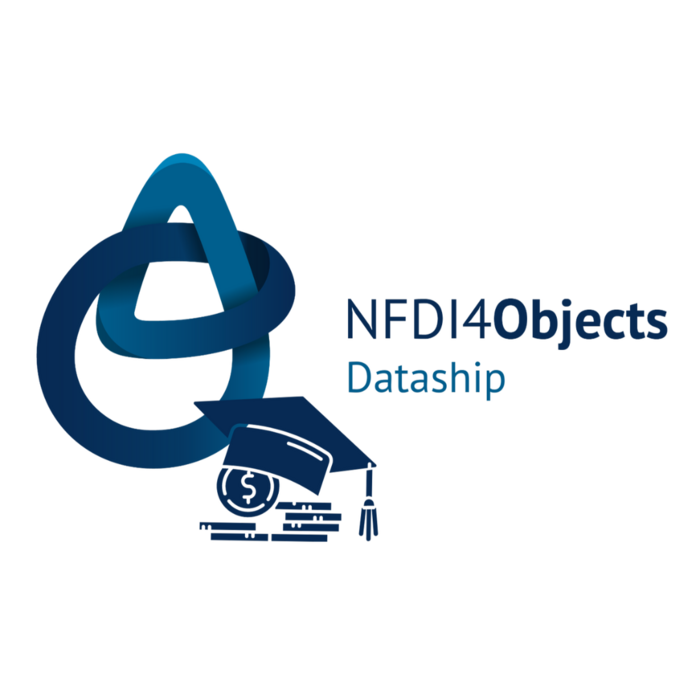
This year, our NFDI4Objects Dataships were advertised for the first time. You can find all information here.
The winners of the NFDI4Objects Dataship 2024
In the first year of the call, we received a dozen applications from five different countries. The entire range of disciplines that we represent as a consortium were covered. We received proposals for FAIRification concepts from the fields of prehistory and early history, classical archaeology, numismatics, Egyptology, material sciences, archaeometry and art history. After a successful pitch event on 14 June 2024, where ten applicants presented their proposals, our Steering Committee selected four winners. We would like to present these winners to you here.
Anne Herzberg-Beiersdorf
Anne Herzberg-Beiersdorf studied Classical Studies and Egyptology at the Free University of Berlin and focussed early on in her education on the indexing, documentation and analysis of objects and monuments of pharaonic culture. As a member of various field projects in Egypt, as a contributor to the digital dictionary project of the Saxon Academy of Sciences and Humanities and as a scientific museum assistant at the Egyptian Museum and Papyrus Collection of the National Museums in Berlin, she was able to consistently expand her knowledge and skills in the field of Egyptian material culture. She is currently working as a research assistant at the Department of Archaeology and Cultural History of Northeast Africa at the Humboldt University in Berlin.
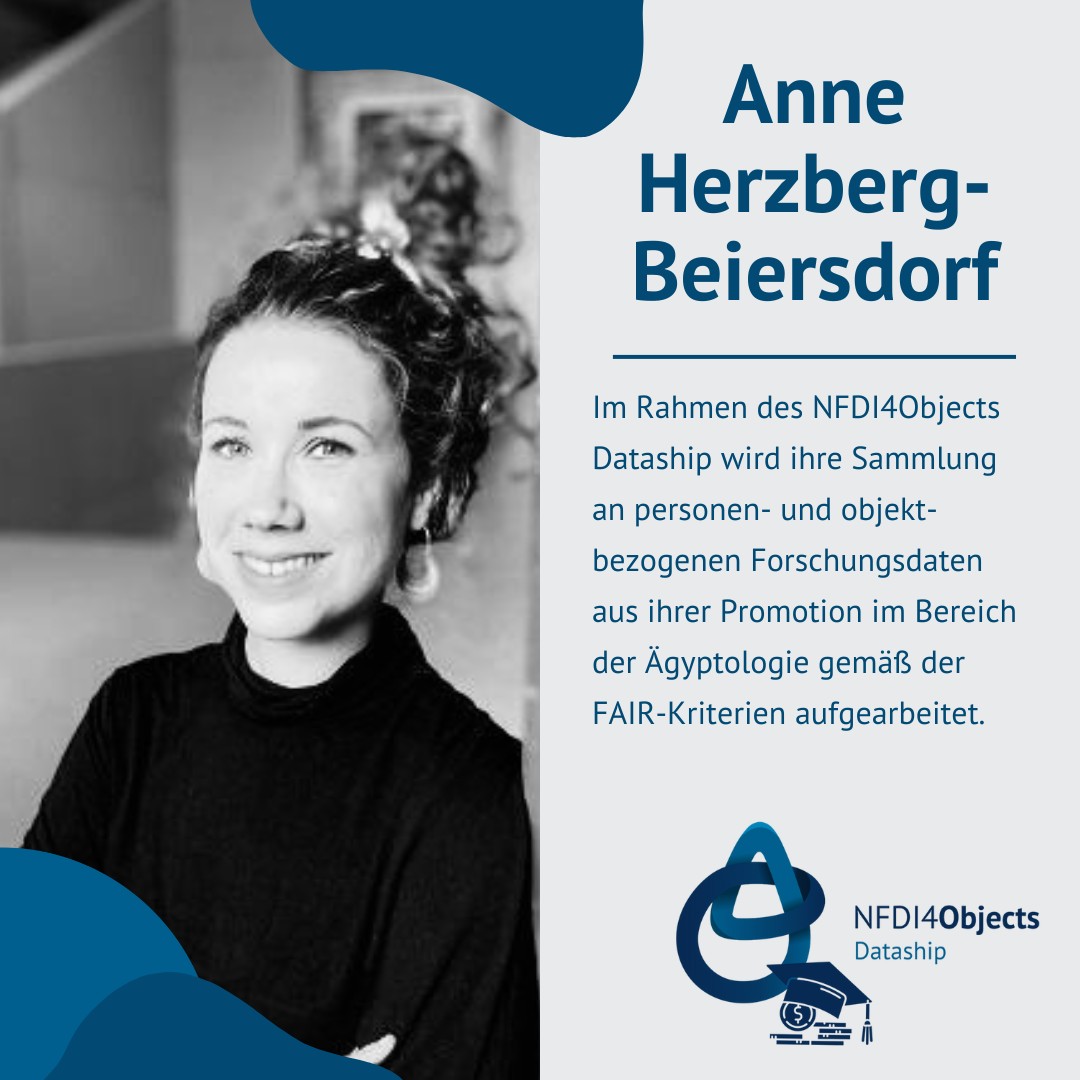
As a result of her doctorate, which she completed with summa cum laude: ‘Prosopographia Memphitica. Individual Identities and Collective Biographies of a Royal Residential City of the New Kingdom’ at the Free University of Berlin, Anne Herzberg-Beiersdorf compiled a collection of object- and person-based research data that exceeds anything that has ever been recorded in Egyptology for a site from the 2nd millennium BC. This is now to be revised and published in accordance with the FAIR criteria as part of the three-month NFDI4Objects Dataship.
Cornelia Lechner
Cornelia Lechner studied archaeological sciences with a focus on ancient prehistory at the Friedrich-Alexander University Erlangen-Nuremberg. During her studies, she supervised the institute’s prehistoric and early historical teaching collection, was involved in the museum education working group ‘Vorzeitkiste’ and developed a concept of techno-morphological feature analysis for Palaeolithic tools made from animal bones or antlers that were used to process animal skins (so-called ‘lissoirs’) for her master’s thesis. Since January 2024, Cornelia Lechner has been working as a doctoral student at the DFG-funded Research Centre for Rock Art Archaeology at FAU Erlangen and is analysing the Magdalenian period stone artefacts from the Enlène cave for her dissertation.
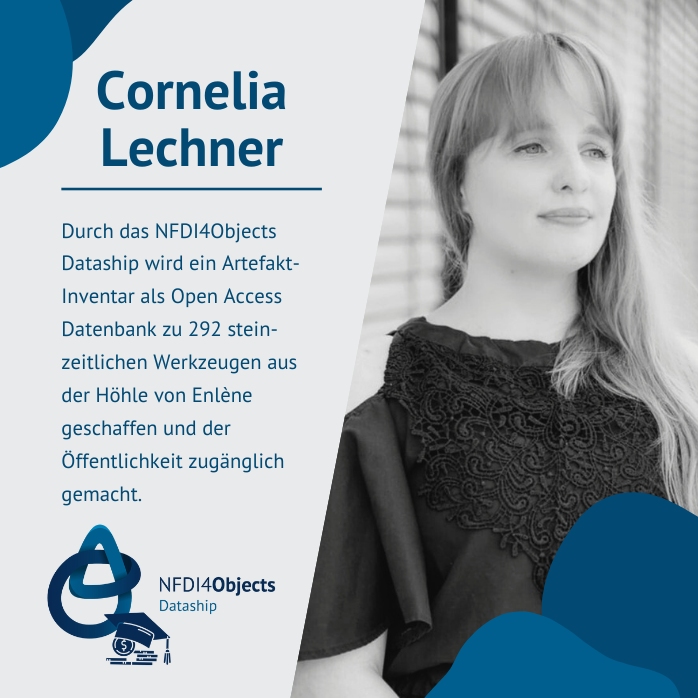
As part of the NFDI4Objects Dataship, the dataset generated for the master’s thesis on the 292 bone tools (lissoirs) from Enlène, consisting of 27 morphological, technological and metric data each, will be made available to the public and prepared and published in the form of an open access database in accordance with the FAIR criteria in order to make organic artefact inventories more comparable in the future.
Hristina Ivanova
Hristina Ivanova is a classical archaeologist and numismatist who studied in Heidelberg, Berlin and Athens. She completed her doctorate with a die study on the coinage of the Milesian Apoikia Apollonia Pontike. She has worked at the Berlin-Brandenburg Academy of Sciences and Humanities, the branch office of the German Archaeological Institute in Athens and the University of Zurich and is currently a research associate on the ERC project RESP at the University of Verona. Her research interests focus on Greek and provincial Roman coinage in the eastern Mediterranean, Thrace and the Black Sea as well as on coins found in the context of Kalapodi, Samos, Herakleia Sintike and Deultum.
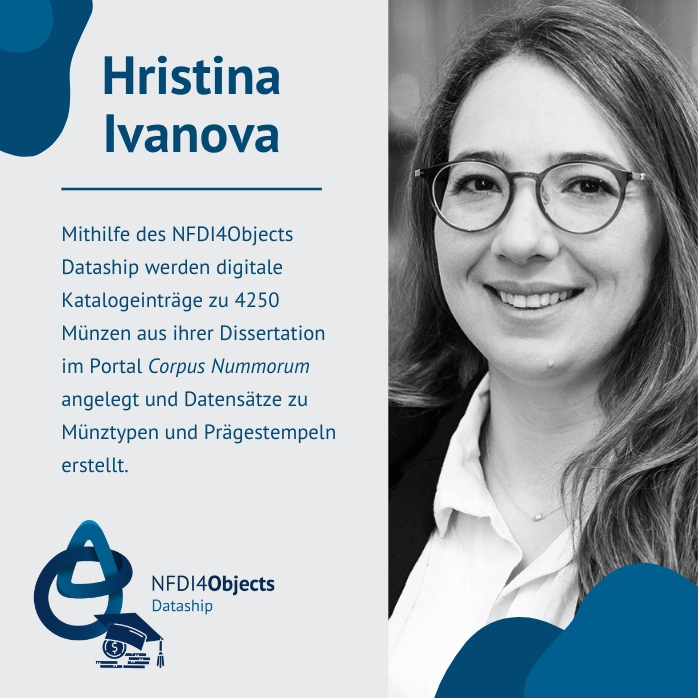
During the three-month fellowship, the NFDI4Objects Dataship will be used to create catalogue entries for 4250 coins from her dissertation in the established portal Corpus Nummorum and additionally create digital datasets on the coin types and dies.
Anne Klammt
Anne Klammt studied prehistory and early history in Regensburg and completed her doctorate in Hamburg. After several years in archaeology, she switched to the coordination and development of digital humanities projects. After working at the Mainz Centre for Digitality in the Humanities and Cultural Studies (mainzed), CLARIAH-DE at the SUB Göttingen and the German Forum for Art History in Paris, she has been responsible for the areas of digital humanities, digital publishing and knowledge transfer at the Hannah Arendt Institute for Totalitarianism Research (HAIT) at TU Dresden since 2023.
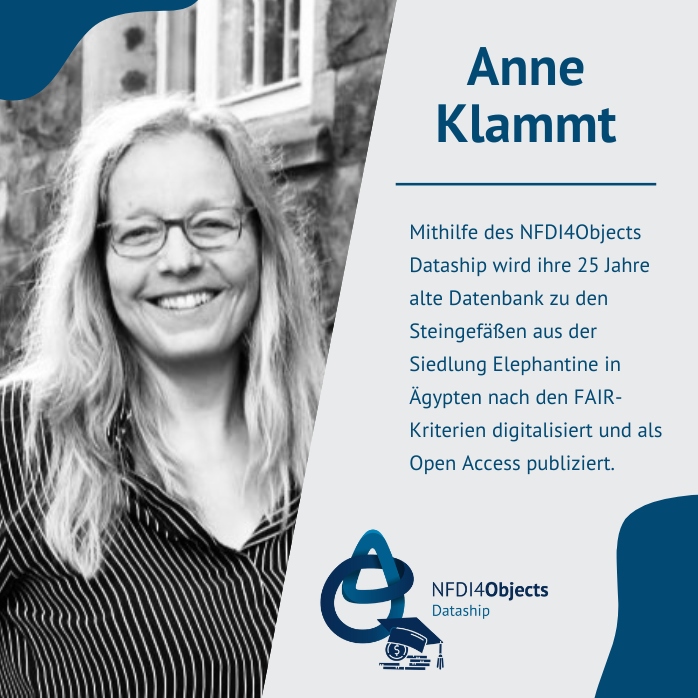
With the help of the NFDI4Objects Dataship, she can realise a long-cherished dream and digitise her almost 25-year-old database on the stone vessels from the Elephantine settlement in Aswan (Egypt), process it according to the FAIR criteria and then publish it as open access.
Call for Proposals
First call for tenders for the NFDI4Objects Dataship.
Every day, students, researchers and lecturers collect research data in projects and papers. The usability of this data often ends with the end of the project or submission of the term paper. It cannot be found or accessed by other researchers and is rarely documented in such a way that it can be used in other research scenarios.
NFDI4Objects wants to change that! Research data should become FAIR - Findable, Accessible, Interoperable and Reusable - and the data should thus be given a life cycle. The more binding the standards for collecting and storing such research data are, the greater the benefits for all researchers. The development and design of such standards is the core task of our project. To do this, we need the support of those who will later benefit from it. We support this process with our dataship.
Application deadline: 17 May 2024
What is the NFDI4Objects Dataship?
Dataship combines the terms ‘data’ and ‘fellowship’. It is a three-month fellowship that involves the preparation of datasets by their creators in accordance with the FAIR criteria for a fee.
We are looking for cultural-historical and scientific object-related data sets that have been collected as part of term papers, final theses or qualification papers, for the preparation of a scientific paper, within a research project, an excavation or similar. The data must be related to the thematic and methodological focus of our consortium - however, there is no disciplinary restriction. You can find more information on the main topics of NFDI4Objects on our website.
Who can apply for the NFDI4Objects Dataship?
The Dataship is aimed at researchers at all career levels: Bachelor’s and Master’s students can apply, as can doctoral students, post-docs, researchers and teaching staff.
What does the NFDI4Objects Dataship contain?
Existing data will be processed according to the FAIR criteria during the three-month term of the Dataship and then made available open access to all interested parties and researchers. The winners of the dataship will each receive 7,500 euros. For the duration of the Dataship, the winners will receive professional support from mentors from the ranks of the steering group and the employees of our consortium.
A total of four Dataships will be awarded. The winners will be notified on 26 June 2024. The term begins on 1 July 2024 and ends with the submission deadline on 11 October 2024. Payment will be made in two instalments: the first instalment will be made upon submission of the concept for the preparation of the dataset, the second upon publication of the dataset according to open access criteria (see note below).
How can I apply?
Interested parties can apply until 17 May 2024 with a proposal for the processing and FAIRification of their dataset for the NFDI4Objects Dataship. Please submit applications including proposal by e-mail to our Helpdesk with the subject ‘Dataship’.
The proposal must justify why …
- the dataset is of scientific importance for the respective discipline that is the focus of NFDI4Objects.
- the FAIRification addresses exemplary challenges of research data management.
- the effort is appropriate for a funding period of three months and an award of 7,500 euros.
In addition, applicants must present their dataset and their concept for its processing and FAIRification at a pitch event on 14 June 2024 after the end of the call for proposals. This should include both a basic technical concept and the licence under which the completed FAIRified data is expected to be made available later. See also: https://opendefinition.org/licenses/
The winners will be selected by the NFDI4Objects steering committee, chaired by spokesperson Dr Philipp von Rummel, according to the above-mentioned content criteria. The winners will be notified on 26 June. Funding begins on 1 July and ends with submission on 11 October 2024.
Note: Upon acceptance, the winners of the dataship agree to transfer the copyright, rights of use and exploitation rights for the purpose of publication under the CC BY 4.0 licence, or an equivalent licence, to the German Archaeological Institute in accordance with Section 661 (4) of the German Civil Code (BGB).
If you have any questions about the content of the dataship, please contact the Science IT Coordinator at NFDI4Objects, Fabian Fricke (fabian.fricke@dainst.de).
We wish you success with your application!